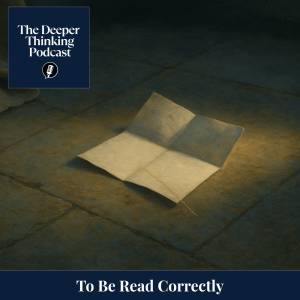
Thursday May 29, 2025
To Be Read Correctly: Autism, ADHD, and the Architecture of Misrecognition - The Deeper Thinking Podcast
To Be Read Correctly: Autism, ADHD, and the Architecture of Misrecognition
For listeners drawn to neurodivergence, diagnostic ethics, and the redesign of perception itself.
What happens when a diagnosis comes not as revelation, but as restitution? In this episode, we explore the late discovery of Autism and ADHD—not as deficits to be managed, but as architectures of experience long misinterpreted by the systems meant to support them. Drawing from narrative medicine, disability studies, and the philosophy of epistemic injustice, we ask what it means to finally be read correctly—and what it costs to have been misread for so long.
This is not an episode about coping mechanisms or late-blooming self-discovery. It is a meditation on masking as critique, burnout as design failure, and joy as diagnostic signal. With quiet nods to thinkers like Devon Price, Gabor Maté, and Damian Milton, we explore how diagnostic delay reshapes identity—and how diagnosis, when framed ethically, becomes a blueprint for rebuilding the social contract around different ways of sensing, thinking, and being.
Reflections
Here are some reflections that surfaced along the way:
- Diagnosis is not identity—it is the removal of misidentity.
- Masking isn’t performance. It’s what happens when intelligibility becomes a survival skill.
- Burnout isn’t fragility. It’s the receipt for years of misinterpretation.
- Being “read correctly” is not a gift. It’s a late correction to a structural silence.
- Joy can be diagnostic. So can precision, stimming, stillness, and refusal.
- Systems don’t just misread neurodivergent people. They are built not to read them at all.
- The opposite of dysfunction is not normalcy. It’s being held in a space designed for your signal to emerge.
- To unmask is not to become visible—it’s to stop being rewritten.
Why Listen?
- Reframe Autism and ADHD as forms of epistemic clarity, not clinical deviation
- Explore how diagnosis functions as narrative repair
- Understand misrecognition as a structural—not personal—injury
- Engage with thinkers like Fricker, Price, and Maté on late diagnosis, masking, and the ethics of recognition
Listen On:
Support This Work
If this episode stayed with you and you’d like to support the ongoing work, you can do so here: Buy Me a Coffee. Thank you.
Bibliography
- Price, Devon. Unmasking Autism. Harmony Books, 2022.
- Maté, Gabor. The Myth of Normal. Avery, 2022.
- Milton, Damian. “The Double Empathy Problem.” Autism, 2012.
- Fricker, Miranda. Epistemic Injustice. Oxford University Press, 2007.
Bibliography Relevance
- Devon Price: Frames autism as a valid identity and critiques masking as survival labor.
- Gabor Maté: Connects ADHD to trauma and systemic overwhelm, not moral failing.
- Damian Milton: Introduces the “double empathy problem” as a mutual misreading, not individual deficit.
- Miranda Fricker: Provides a foundational theory of epistemic injustice—being disbelieved or misread because of who you are.
To be read correctly is not a diagnosis. It is the quiet return of narrative sovereignty.
#Autism #ADHD #Neurodiversity #Diagnosis #EpistemicInjustice #DevonPrice #GaborMate #DamianMilton #Masking #NarrativeRepair #DoubleEmpathy #TheDeeperThinkingPodcast
No comments yet. Be the first to say something!